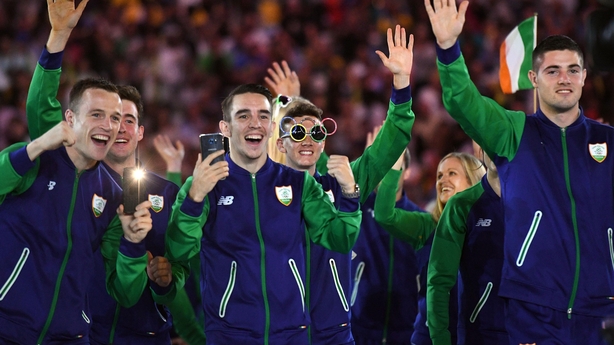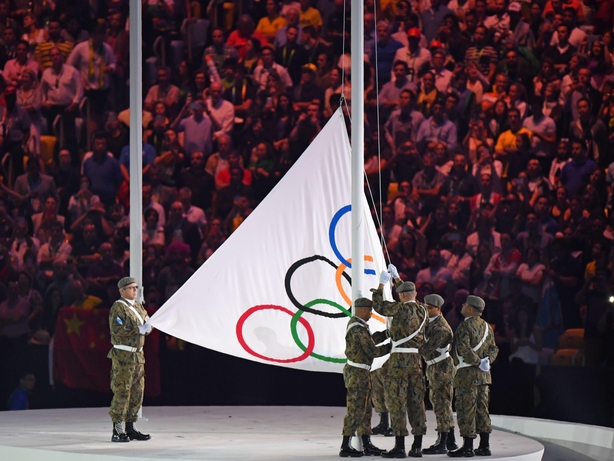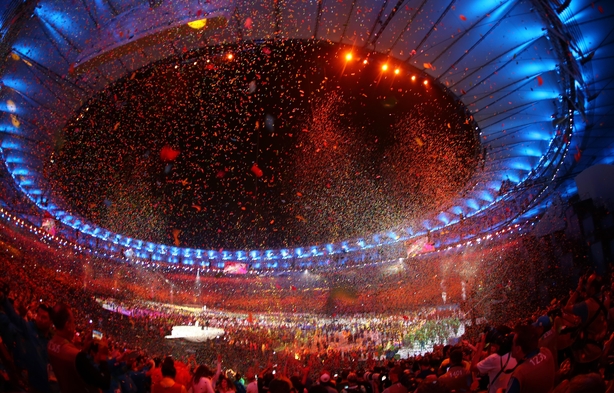Double Olympic bronze medallist Paddy Barnes proudly led out Team Ireland at the Maracana Stadium at a spectacular opening ceremony in Brazil in the early hours of Saturday morning.
Cheers rang out for the Irish as Belfast light flyweight Barnes lofted the tricolour into the Rio sky to kickstart the 31st summer Games.
The ceremony deviated from its carefully-constructed script within five minutes of the lavish event starting however, when Brazil's acting president Michel Temer was not announced to the crowd.
Temer, who took office in May when impeachment procedures were started against president Dilma Rousseff, was meant to be presented alongside International Olympic Committee president Thomas Bach.
It is unclear why Temer was not announced, although the protests against the cost of the Games that have marred the build-up to Rio's big moment on Friday would suggest organisers were concerned he would be jeered.

That is a fate that befell athletes from Brazil's traditional rival Argentina, although those boos were of the pantomime variety and the selfie-snapping Argentinians did not appear to be remotely fazed.
Overall, the atmosphere in the Maracana was celebratory, as a succession of actors, dancers and musicians raced through routines intended to showcase Brazil's culture, diversity and history, even finding time for a brief lecture on environmental issues.
Brazilian supermodel Giselle Bundchen's sashay across the stadium to the sound of 'The Girl from Ipanema' will no doubt feature in newspapers around the globe, as will a clever section that featured a biplane appearing to fly out of the stadium and circle the city's signature 'Christ the Redeemer' statue.
The ceremony's creative director, Fernando Meirelles, had less money to spend than his predecessors - including the mastermind of London 2012's memorable show Danny Boyle - but he promised "the coolest party" and he has certainly given it a go.

And the roar the crowd gave the likes of Spain's Rafael Nadal and the United States team, led by Michael Phelps, would support the view that has been growing here that Rio is ready to forget its concerns about the broken political system, struggling economy and alarming Zika virus to enjoy its moment as the centre of the world's attention.
However, before the ceremony got under way at 8.00pm local time (12am Irish time), thousands of anti-government protesters marched less than eight miles away at the Copacabana. The majority of protesters seemed to be supporters of Rousseff, chanting "Dilma, ole, ole, ole" repeatedly.
The jeers Brazil's interim leader Temer was trying to avoid at the outset of the ceremony could not be avoided later on, though, as his short address to officially open the Olympics was drowned out by loud catcalls.
The reasons for this were referenced in the main speeches of the night by the chairman of the Rio 2016 organising committee Carlos Nuzman and IOC president Bach.
These are difficult times for a country that was enjoying rapid economic growth when Rio won the right to host the Games but is now in recession.
Bach, however, said the Games were a "catalyst for transforming Rio into a modern metropolis that is even more beautiful than before", while Nuzman said he was the "proudest man alive" that his city had got this far.

Nuzman's mention of central government support for Rio 2016's budget was briefly jeered but he was on safer ground when he told the crowd "the whole world is here and we welcome them with open arms".
The biggest cheers for Bach's speech came when he started by reminding everybody that these are the first Olympics to be staged in South America, and then when he welcomed the team of refugee athletes, saying the Olympics were the answer to the world's "growing selfishness".
There then followed the first ever awarding of an "Olympic laurel" to Kenyan running great Kip Keino, before the traditional unfurling of the Olympic Flag, rendition of the Olympic Anthem and recitation of Olympic oaths.
That set the stage for night's final act: lighting the cauldron with the Olympic flame, which was done by former marathon runner Vanderlei de Lima.
And with that, the athletes started to file out of the stadium and head for their beds, while the bulk of the crowd recorded the fireworks on their smartphone cameras.
Things start for real this morning, not a moment too soon for a city and a country in need of a lift and an Olympic family desperate to get back to what really matters - the sport.


